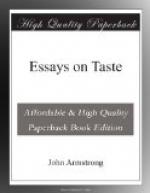Rough weary roads thro’ barren wilds he tried,
Yet still he marches with true Roman pride:
Sometimes a meteor, gorgeous, rapid, bright, 145
He streams athwart the philosophic night.
Find you in Horace no insipid Odes?—
He dar’d to tell us Homer sometimes nods;
And but for such a aide’s hardy skill
Homer might slumber unsuspected still. 150
[Footnote A: A poem of Tibullus’s
in hexameter verse; as yawning and
insipid as his elegies are tender and
natural.]
Tasteless, implicit, indolent
and tame,
At second-hand we chiefly praise or blame.
Hence ’tis, for else one knows not
why nor how,
Some authors flourish for a year or two:
For many some, more wond’rous still
to tell; 155
Farquhar yet lingers on the brink of hell.
Of solid merit others pine unknown;
}
At first, tho’[A] Carlos swimmingly
went down, }
Poor Belvidera fail’d to melt the
town. }
Sunk in dead night the giant Milton lay
160
’Till Sommer’s hand produc’d
him to the day.
But, thanks to heav’n and Addison’s
good grace
Now ev’ry fop is charm’d with
Chevy Chace.
[Footnote A: Don Carlos, a tragedy of Otway’s, now long and justly forgotten, went off with great applause; while his Orphan, a somewhat better performance, and what is yet more strange, his Venice Preserved, according to the theatrical anecdotes of those times, met with a very cold reception.]
Specious and sage, the sovereign
of the flock
Led to the downs, or from the wave-worn
rock 165
Reluctant hurl’d, the tame implicit
train
Or crop the downs, or headlong seek the
main.
As blindly we our solemn leaders follow,
And good, and bad, and execrable swallow.
Pray, on the first throng’d
evening of a play 170
That wears the[A] facies hippocratica,
Strong lines of death, signs dire of reprobation;
Have you not seen the angel of salvation
Appear sublime; with wise and solemn rap
To teach the doubtful rabble where to
clap?— 175
The rabble knows not where our dramas
shine;
But where the cane goes pat—by
G— that’s fine!
[Footnote A: The appearance of the
face in the last stage
of a consumption, as it is described by
Hippocrates.]
Judge for yourself; nor wait
with timid phlegm
Till some illustrious pedant hum or hem.
179
The lords who starv’d old Ben were
learn’dly fond
Of Chaucer, whom with bungling toil they
conn’d,
Their sons, whose ears bold Milton could
not seize, }
Would laugh o’er Ben like mad, and
snuff and sneeze, }
And swear, and seem as tickled as you
please. }




